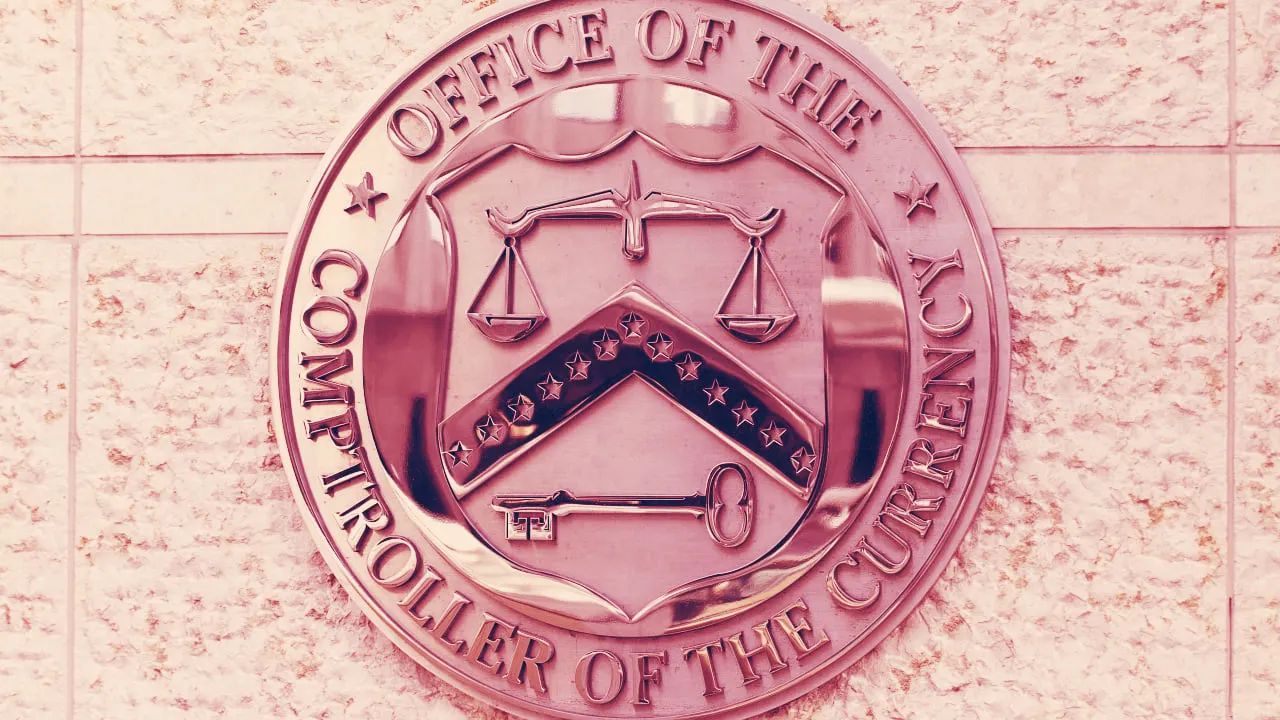In brief
- The OCC is an independent bureau of the US Treasury.
- It has issued guidance stating that banks may use blockchains and stablecoins to facilitate payments.
- The OCC has come under scrutiny from some legislators for its pro-crypto outlook.
The Office of the Comptroller of the Currency (OCC), the bureau of the US Treasury Department charged with regulating banks, has stated that banks may use stablecoins and blockchains for payments.
In an interpretive letter issued today, the OCC clarified that, as long as it complies with the law and sound banking practices, "a national bank or federal savings association may validate, store, and record payments transactions by serving as a node on an INVN [independent node verification network]. Likewise, a bank may use INVNs and related stablecoins to carry out other permissible payment activities."
Acting Comptroller of the Currency Brian Brooks, a former Coinbase executive, indicated in a press release that the move is about leveraging the cryptocurrency industry to keep pace: “While governments in other countries have built real-time payments systems, the United States has relied on our innovation sector to deliver real-time payments technologies."
The letter makes this clear, noting that, as financial intermediaries, banks face competition to move funds faster. In the OCC's eyes, INVNs, such as blockchains and other distributed ledger technologies, are a way of efficiently and speedily moving funds.
Moreover, the letter states that banks may issue stablecoins as they might debit cards or checks, and exchange them for fiat. The OCC makes it all sound hunky-dory: "Banks have long used cashiers’ checks, travelers’ checks, and other bearer instruments as a means of facilitating cashless payments."
Jeremy Allaire, co-founder and CEO of Circle, which operates the USDC stablecoin, struck a more emphatic note. He tweeted, "This is a huge win for crypto and stablecoins."
1/ Breaking major news from US Treasury OCC, the largest US banking regulator (@USOCC), with new guidance allowing US banks to use public blockchains and dollar stablecoins as a settlement infrastructure in the US financial system. https://t.co/gQFWISWUnc
— Jeremy Allaire (@jerallaire) January 4, 2021
He added: "We are on a path towards all major economic activity being executed on-chain. It is tremendous to see such forward thinking support from the largest regulator of national banks in the United States."
Though the OCC has taken a solidly pro-crypto stance when it comes to financial innovation (as it notes repeatedly in the letter), its latest missive comes amid regulatory uncertainty for the cryptocurrency industry.
In mid-December, a separate bureau of the US Treasury, the Financial Crimes Enforcement Network (FinCEN), proposed rules requiring money services businesses, including banks and crypto exchanges, to record and report cryptocurrency transactions to private wallets if they meet a certain dollar threshold. The period for public comment, which spanned multiple federal holidays, ends today.
While the proposed FinCEN rules would in no way be mutually exclusive of the OCC rules issued today, it does indicate the general air of uncertainty, partially stoked by the unveiling of the Stablecoin Tethering and Bank Licensing (STABLE) Act early last month.
That bill, introduced by Rep. Rashida Tlaib in the US House of Representatives, would regulate stablecoin operators like banks. Rep. Tlaib and other representatives have taken issue with Brooks' stewardship of the OCC, writing in a November letter that he placed "excessive focus on crypto assets and crypto related financial services."
House Financial Services Committee Chair Maxine Waters in December sent a separate letter to President-elect Joe Biden, asking him to appoint officials at the OCC who will keep a clearer separation between banks and FinTech companies. One recommendation she provided was to rescind OCC guidance allowing national banks to take custody of cryptocurrencies for their clients, a rule today's edict is clearly built upon.





